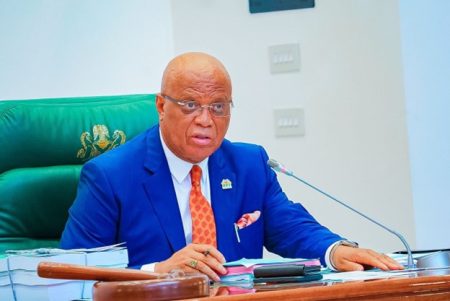 19 June 2013, Aba – It was a long drama of irony in Aba, Abia State, as leaders of electricity workers under the aegis of the National Union of Electricity Employees, NUEE, who fought Professor Bart Nnaji, from July 2011 to August 2012, when he served as the Minister of Power, on Monday lavished praises on him, saying their tussle with him when he was a minister was “nothing personal.”
19 June 2013, Aba – It was a long drama of irony in Aba, Abia State, as leaders of electricity workers under the aegis of the National Union of Electricity Employees, NUEE, who fought Professor Bart Nnaji, from July 2011 to August 2012, when he served as the Minister of Power, on Monday lavished praises on him, saying their tussle with him when he was a minister was “nothing personal.”
Led by the President of NUEE, Mr. Mansur Musa, and General Secretary, Joe Ajaero, and other members of the national executive committee, as well as trade union leaders from Rivers and Imo States, the large labour delegation, which came in six vehicles was in Aba, to inaugurate the Aba Power Project, APP, chapter of NUEE.
Speaking during the inauguration, Musa noted that Nnaji stood out from other power sector investors because “he did not connive with state officials to grab our common patrimony in the name of privatisation, to which we are opposed.”
“As an engineer, I can testify to the massive investment by Geometric Power Ltd and Aba Power Limited to guarantee power for 24 hours for 365 days. The 33kv lines, for instance, can hardly trip. We are going to work with Nnaji to see that this place continues as a success story,” he added.
Ajaero, who was the face of the opposition to Nnaji during the latter’s ministerial days, recommended the establishment of about 15 “Nnaji-type” power installations across the nation to power the economy because they “truly add value,” contrasting Nnaji with investors buying up state-owned power utilities.
“When private sector operators build power stations and distributions firms from scratch, they add to the quantum of power available to Nigerians; but when they merely buy over existing government ones, they do not add value to the stock of electricity in the country,”b Ajaero said.
Ajaero, who described the former minister as the most qualified Nigerian investor in the power sector, explained that NUEE opposed him in the past because “as a minister he was given a job to do, a job to implement the 2005 Electric Power Sector Reform Act (ESPRA) and hand over the nation’s 11 distribution companies and six generation firms to the private sector which has grave implications for workers.”
He revealed that long before Nnaji joined the government in 2010 as a presidential adviser before becoming the Minister of Power, he had been working with NUEE for the improvement of power sector workers’ welfare.
“We appreciate his role in the regularisation of the status of thousands of Power Holding Company of Nigeria (PHCN) employees who were for years working as casual staff and we equally appreciate his part in the payment of the monetised benefits of the PHCN staff which had been owed for years,” Ajaero stated.
Nnaji, while responding to the union leaders, stated that “slave labour is not possible in a competitive sector.”
“I have for several years maintained that an overwhelming majority of electricity workers must be Nigerians citizens who are capable and dedicated. Electricity workers in Nigeria now have a choice of deciding where they will work and can even choose to be investors in the sector. This is why I am in support of the power sector reform,” Nnaji said.
Nnaji took NUEE officials on an inspection of the plant which is about to start commercial operations. The official inauguration will take place in August to mark the third anniversary of President Goodluck Jonathan’s launch of the Roadmap for Power Sector Reform in Lagos on August 10, 2010.
– This Day


